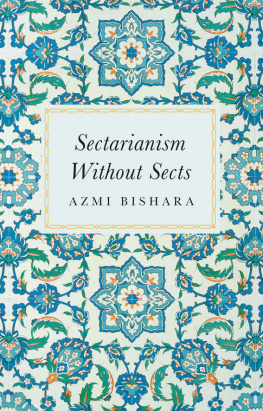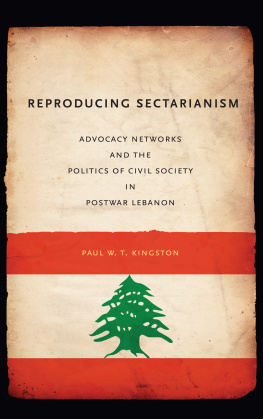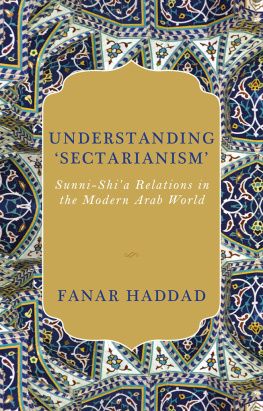Azmi Bishara - Sectarianism Without Sects
Here you can read online Azmi Bishara - Sectarianism Without Sects full text of the book (entire story) in english for free. Download pdf and epub, get meaning, cover and reviews about this ebook. year: 2021, publisher: Hurst Publishers, genre: Politics. Description of the work, (preface) as well as reviews are available. Best literature library LitArk.com created for fans of good reading and offers a wide selection of genres:
Romance novel
Science fiction
Adventure
Detective
Science
History
Home and family
Prose
Art
Politics
Computer
Non-fiction
Religion
Business
Children
Humor
Choose a favorite category and find really read worthwhile books. Enjoy immersion in the world of imagination, feel the emotions of the characters or learn something new for yourself, make an fascinating discovery.
- Book:Sectarianism Without Sects
- Author:
- Publisher:Hurst Publishers
- Genre:
- Year:2021
- Rating:3 / 5
- Favourites:Add to favourites
- Your mark:
- 60
- 1
- 2
- 3
- 4
- 5
Sectarianism Without Sects: summary, description and annotation
We offer to read an annotation, description, summary or preface (depends on what the author of the book "Sectarianism Without Sects" wrote himself). If you haven't found the necessary information about the book — write in the comments, we will try to find it.
Sectarianism Without Sects — read online for free the complete book (whole text) full work
Below is the text of the book, divided by pages. System saving the place of the last page read, allows you to conveniently read the book "Sectarianism Without Sects" online for free, without having to search again every time where you left off. Put a bookmark, and you can go to the page where you finished reading at any time.
Font size:
Interval:
Bookmark:
SECTARIANISM WITHOUT SECTS
AZMI BISHARA
Sectarianism
Without Sects

HURST & COMPANY, LONDON
First published in the United Kingdom in 2021 by
C. Hurst & Co. (Publishers) Ltd.,
83 Torbay Road, London NW6 7DT
Azmi Bishara, 2021
English language translation Chris Hitchcock, 2021
All rights reserved.
Printed in India
The right of Azmi Bishara to be identified as the author of this publication is asserted by him in accordance with the Copyright, Designs and Patents Act, 1988.
A Cataloguing-in-Publication data record for this book is available from the British Library.
ISBN: 9781787383210
www.hurstpublishers.com
CONTENTS
PREFACE
In my Religion and Secularism in Historical Context (3 volumes, 201415), I discussed theories of secularisation and secularism. I also looked briefly at aspects of this process in Arab countries, promising to return to the subject in a special volume. I still hope to keep this promise, but other more pressing topics of research have meant that so far I have not been able to: in the intervening period I was busy writing Egypts Revolution (2016, two volumes), An Essay on Freedom (2016), and The Army and Politics: Theoretical Problems and Arab Case Studies (2017).
I am thus pleased to present to readers, researchers and other interested parties this book on sectarianism, which intersects in many respects with that as yet unwritten volume on secularism and secularisation in the Arab World. These intersections derive from the relationship that exists between the type of modernisation and secularisation that Arab countries have experienced and the emergence of two phenomena: the political mode of religiosity and political sectarianism, the second of which is the subject of this book.
Sectarianism is a theoretical-historical issue in its own right, and deserves more than one study. Although I have tried to maintain as wide a scope as possible while focusing on historical cases and theoretical sub-issues at the same time, there are many more sub-issues that could have been discussed. But any book must have a beginning and an end.
Sectarianism and the putative SunniShii conflict have concerned the Arab World and specialists in its affairs ever since the occupation of Iraq. The Syrian Revolution and the attendant domestic and regional unrest have since placed these issues in the foreground once more. Today, sectarianism is one of the most important issues in the Arab Mashreq, raising a number of questions. Are the political conflicts that have rocked this region rooted in religion, class or ethnicity? What does sectarian mean? Has sectarianism always been present? And will it ever go away?
In my book On the Arab Question, published in 2007that is, more than a decade agoI noted that the crisis of the Iraqi state precipitated by the occupation had meant that political sectarianism (including as a system of governance), which until then had been a problem specific to Lebanon, was suddenly on the agenda in a much broader way. Much has been written on the sectarian system in Lebanon, and studies have been produced on sectarianism from the perspective of the minorities question in one or another country; most recently, numerous books and papers have been published addressing the question in the Iraqi context. I have attempted to familiarise myself with the existing literature, and although some of it is sure to have escaped my attention, you will find in this book a review of what has already been written.
While examining the literature, however, I noticed that there was no holistic work combining theoretical contributions with sociological and historical research, and no attempt to come up with a theory of sectarianism drawn from a region that provides a veritable living laboratory for the phenomenon. The closest literature that I could find were Burhan Ghaliouns The Sectarian Question and the Minority Problem (1979) and The Sectarian System: From State to Tribe (1990), both published in Arabic.
This book is an attempt to combine a theory of sectarianism with a historical-sociological study of the emergence of imagined communities of religion (todays religious taifas), distinguishing between sects on the one hand and traditional local communities of religion on the other. It also discusses the transformation of social sectarianism into political sectarianism, a process which produces the aforementioned imagined communities of religion. It draws on sociological theories, analysis of social history and examination of case studies from various Arab countries, also comparing these case studies with examples from outside of the Arab World.
As well as the book you are now reading, my efforts in these areas produced lengthy studies of sect and sectarianism in the Ottoman Empire and their relationship with religious communities, the transformation of the Shia into a confession, and the transformation of a confession into a communal confession. These chapters were not included in this book for fear of excessive digression and mounting length, but I hope eventually to return to them. Some parts were incorporated as illustrative examples in the Arabic edition, but a whole section on Iraq and a chapter on consociationalism comparing Ireland and Lebanon were dropped from the English translation due to concerns of space.
This book also attempts to answer certain other theoretical-historical questions that may help us better understand the issue at hand and to unpick some of its complexities. These may serve as useful first steps towards contending with the reality of sectarianism and its ethical dimensions, which in my view are its most dangerous aspect: sectarianism replaces values with identity, and good and bad, virtue and vice, with us and them.
The book aims to develop a theory of the relationship of community of religion to sectarianism and the emergence of imagined communities. It argues that as a rule, religious affiliation has only ever formed a free-standing social entity in a parochial, local sort of way, through existing social structures (village, neighbourhood, tribe).
My first thesis is that political sectarianism is a modern phenomenon. Sectarian conflicts pertaining to status, power, and shares in the state are different from wars of religion; sectarian discrimination is different from religious persecution.
My second thesis is that an imagined community of religion is a modern social imaginary based on the sectarian conceptualisation of a religious or confessional affiliation as an identity shared by peoplepeople who have never formed a community in practicewithin a vast imagined community, using a selective reading of history and legend.
My third thesis is that religious communities do not produce sectarianism, but sectarianism reproduces these communities as imagined communities, like the Shii and Sunni taifas.
My fourth thesis is that power in modern authoritarian regimes is not attained by sectarian (Khaldunian) asabiyya (group solidarity), but an authoritarian regime might use primordial ties to ensure loyalty and thereby produce sectarianism.
My fifth thesis is that unlike a traditional community, an imagined community is not an ethical community.
The overlapping historical and theoretical analysis in this book will show that the theoretical perspective provided by these theses helps to explain the phenomenon of sectarianism.
A community in the local or parochial sense is bound together by so-called primordial ties (kinship relations, inherited customs, norms, internal hierarchies) that exclude outsiders, thereby producing its borders from the inside out. Sectarianism, meanwhile, produces or reproduces communities from the outside in by delineating its borders against the other. Here, the borders produce the imagined community; the community does not produce the borders.
Next pageFont size:
Interval:
Bookmark:
Similar books «Sectarianism Without Sects»
Look at similar books to Sectarianism Without Sects. We have selected literature similar in name and meaning in the hope of providing readers with more options to find new, interesting, not yet read works.
Discussion, reviews of the book Sectarianism Without Sects and just readers' own opinions. Leave your comments, write what you think about the work, its meaning or the main characters. Specify what exactly you liked and what you didn't like, and why you think so.







